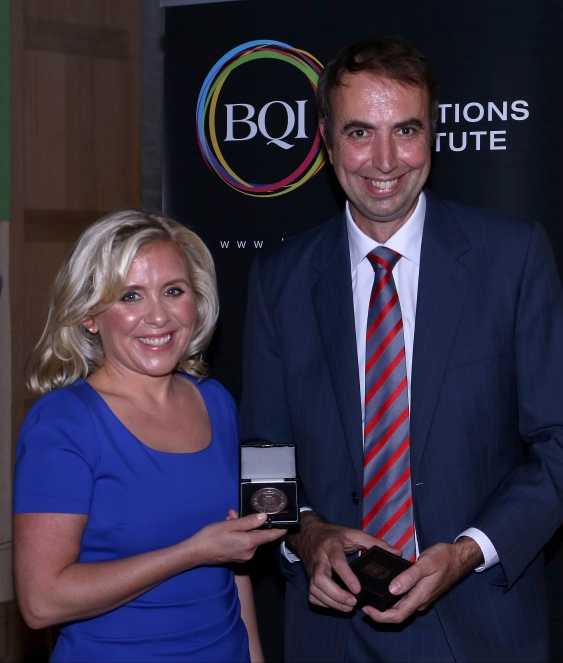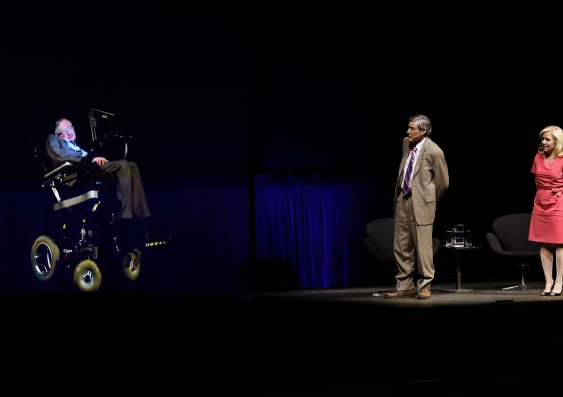The world’s most famous physicist, Professor Stephen Hawking, and his daughter Lucy, a renowned author, have been awarded the 2015 UNSW Medal for Science Communication.
UNSW Dean of Science Professor Merlin Crossley presented the medals to Lucy Hawking on Sunday night ahead of her father’s appearance from the University of Cambridge via hologram at a sold-out public lecture at the Sydney Opera House.

Lucy Hawking with the UNSW science communication medals presented by Dean of Science Merlin Crossley
Professor Crossley congratulated Lucy Hawking on being a great communicator of science who initiated the ‘George’ series of children’s books, co-written with her father. These stories of George and Annie and their cosmic adventures have sold millions of copies.
“Educating and inspiring the next generation of scientists is one of the most important things we can do. Just as Lucy has been inspired by her father Stephen, I hope the books they have written together continue to inspire generations to come,” Professor Crossley said.
Lucy Hawking said it was a very great honour to receive the UNSW medal and to share it with her father.
“We both passionately believe in the importance of communicating science to the widest audience possible and the youngest audience possible. This is a lovely piece of recognition of the work we have done.”
Lucy thanked Professor John Webb and Darren Dougan and the UNSW Big Questions Institute for inviting her to participate in the event, which she described as a “magnificent fusion” of cutting-edge technology, science, and the world of the arts at the iconic Sydney Opera House.
“I have never participated in anything as outstanding or as memorable,” she said.
The world-first event, which was unveiled on Saturday, is the result of a partnership between UNSW’s Big Questions Institute, Cisco and the Sydney Opera House.
UNSW President and Vice-Chancellor Professor Ian Jacobs, said: “The combination of the brilliant and inspiring Stephen Hawking – a scientific thinker like no other – and this remarkable hologram technology created a memorable event for Australian audiences.”
Stephen Hawking’s impact on the public understanding of physics was “extraordinary”, Professor Crossley said, inspiring people around the globe with his knowledge of the nature of the universe, black holes, general relativity and his quest to find a Theory of Everything.
“Stephen is someone who has always asked the big questions, and we are indebted to him for his support for the Big Questions Institute, UNSW’s exciting new science initiative,” Professor Crossley said.
BQI’s director UNSW Professor John Webb said the institute, co-founded with Darren Dougan, Professor Hawking, and others, “brings together some of the most brilliant minds on the planet, to share ideas in tackling fundamental and intriguing questions in modern science”.
The annual UNSW Medal for Science Communication was established in 2014 by Professor Crossley to honour individuals who have shared their knowledge and scientific insights with a broad audience – informing, inspiring and engaging the public on scientific topics and issues.
Watch the video of this event:
Media contacts: Denise Knight, UNSW Media Office, 0405 207 685; Deborah Smith, Faculty of Science, 0478 492 060



